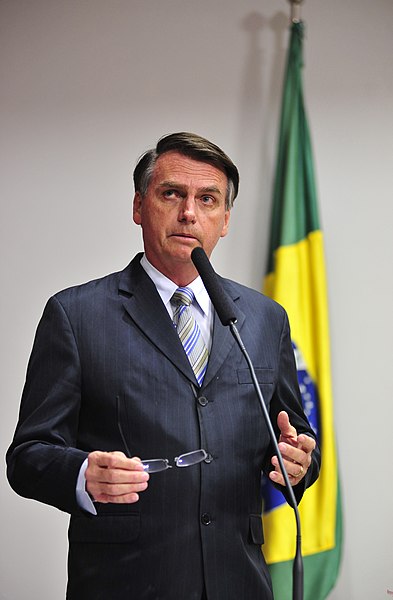
By John L. Allen Jr.
ROME (Crux) — Numerically speaking, Brazil is the largest Catholic country in the world with a Catholic population over 170 million, theoretically around 70 percent of the national total. Although levels of faith and practice vary widely, with secularism making steady gains, and despite serious defections to burgeoning Pentecostal and Evangelical movements, the Church in Brazil still packs a real global punch.
Brazil is also a political and economic pacesetter, especially across Latin America, where developments in the country’s most populous nation and largest economy, with an estimated GDP of $2.25 trillion, are always influential outside its borders.
That brings us to Brazil’s national elections on Wednesday, in which far-right congressman Jair Bolsonaro captured the presidency, fairly easily outdistancing his leftist challenger with 55 percent of the popular vote.
Though it’s too easy to fall into over-simplifications in such things, it’s probably fair to say that in the abstract the 63-year-old Bolsonaro probably is not quite the head of state Pope Francis might have wanted for Argentina’s traditional Latin American rival.
The fact that Bolsonaro has been dubbed the “Trump of the Tropics” provides some hint of where the tensions lie.
To begin with, the author of 2015’s Laudato si’, the first-ever papal encyclical devoted entirely to environmental themes, and the pontiff who’s called a special Synod of Bishops next year on the Pan-Amazonian region in part to focus on themes of conservation and sustainability, likely wasn’t exactly cheered by Bolsonaro’s promise on the campaign trail to open up parts of the Amazon to greater commercial exploitation.
One could go on – Bolsonaro’s attitudes towards immigrants, indigenous persons, the LGBT community, the poor, and so forth. The big-picture doesn’t change, which is that Bolsonaro comes off as, at least potentially, a Latin American version of U.S. President Donald Trump and Filipino President Rodrigo Duterte, meaning not exactly friends of the social agenda laid out by Francis.
In an interview on Tuesday with Vatican News, the Vatican’s own official service, Bishop Leonardo Steiner, secretary of the country’s influential Catholic bishops’ conference, described Church leaders as “worried” about what comes next.
Great Concern About Future
“It’s clear that the episcopal conference is worried, because the words [of the campaign] about indigenous persons were too strong,” he said. “We have a great concern about their future.”
“We’re also worried about the words directed at the Quilombole, who are the descendants of the slaves who fled the interior of the country during the period of slavery, and also the rhetoric about certain parties,” Steiner said. “We’ll see if that rhetoric becomes a program of governance, or remains just words in the wind.”
“The worry is there,” Steiner said, “because we’ve always stood with the indigenous people, the Quilombole, the poor.”
Asked to respond to charges made by some Bolsonaro supporters that the bishops’ conference is “Communist,” Steiner insisted “it doesn’t matter.”
“There’s no truth to it,” he said. “It doesn’t matter if we’re called Communists, or something else. What’s important is being faithful to the Gospel, being faithful to the poor.”
In any event, it’s hardly as if the bishops of Brazil were entirely in lockstep during the campaign. While the conference itself may have been seen as dubious about Bolsonaro, the Archbishop of Rio de Janeiro, Cardinal Orani João Tempesta, openly received him in his office on Oct. 17 and allowed himself to be photographed with the candidate.
Photographs of the event in the newspaper, O Estado de S. Paulo, showed employees of the archdiocese making signs of guns with their hands in front of a statue of Jesus – a sign used by Bolsonaro in his campaign against crime.
So, what’s the Catholic pay-off from all this?
For Pope Francis, it’s seemingly a call to lead. The pontiff is notoriously reluctant to be seen taking sides among contending parties, especially in his native Latin America. He doesn’t like the idea of the Church, or him personally, being manipulated for political gain.
Same Challenge, Different Guise
Yet as Latin America’s most influential nation appears set to veer in a direction hostile to Francis’s priorities, it’s inevitable that Brazilians, and Latin Americans generally, are going to be looking to the pope to provide both an alternative vision and hope that it’s achievable. Just as St. Pope John Paul II had to strike a difficult balance during the Cold War between not being overtly political yet also not coming off as indifferent or detached, the same challenge in a different guise awaits Pope Francis.
For the Brazilian bishops, it’s much the same. Whatever one makes of the great Catholic heroes under the military dictatorship, such as Bishop Hélder Pessoa Câmara, Cardinal Aloísio Lorscheider and Cardinal Paolo Arns – and there is a legitimate debate to be had about each man’s choices at key points – undeniably, they gave ordinary Brazilians a sense that the Church stood with them.
Brazilians may well need that kind of assurance again now, and, given the centrality of the Church in national affairs, it’s hard to imagine where else it might come from. Supplying it will be tough, however, if the bishops aren’t able to achieve a degree of cohesion among themselves.
Playing that role seemed to be the spirit of a statement released by the conference the day the results became clear.
“We will continue to be what we are, a critical voice, a group open to dialogue, seeking what is best for all, not the best for the Church, for us, but for Brazil,” said Archbishop of Salvador Murilo Krieger, vice president of the conference.
